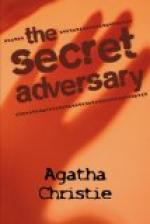“At eleven o’clock?” said Tuppence doubtfully.
“At eleven o’clock.”
Tuppence made up her mind.
“Very well. I’ll be there.”
“Thank you. Good evening.”
He raised his hat with a flourish, and walked away. Tuppence remained for some minutes gazing after him. Then she gave a curious movement of her shoulders, rather as a terrier shakes himself.
“The adventures have begun,” she murmured to herself. “What does he want me to do, I wonder? There’s something about you, Mr. Whittington, that I don’t like at all. But, on the other hand, I’m not the least bit afraid of you. And as I’ve said before, and shall doubtless say again, little Tuppence can look after herself, thank you!”
And with a short, sharp nod of her head she walked briskly onward. As a result of further meditations, however, she turned aside from the direct route and entered a post office. There she pondered for some moments, a telegraph form in her hand. The thought of a possible five shillings spent unnecessarily spurred her to action, and she decided to risk the waste of ninepence.
Disdaining the spiky pen and thick, black treacle which a beneficent Government had provided, Tuppence drew out Tommy’s pencil which she had retained and wrote rapidly: “Don’t put in advertisement. Will explain to-morrow.” She addressed it to Tommy at his club, from which in one short month he would have to resign, unless a kindly fortune permitted him to renew his subscription.
“It may catch him,” she murmured. “Anyway, it’s worth trying.”
After handing it over the counter she set out briskly for home, stopping at a baker’s to buy three penny-worth of new buns.
Later, in her tiny cubicle at the top of the house she munched buns and reflected on the future. What was the Esthonia Glassware Co., and what earthly need could it have for her services? A pleasurable thrill of excitement made Tuppence tingle. At any rate, the country vicarage had retreated into the background again. The morrow held possibilities.
It was a long time before Tuppence went to sleep that night, and, when at length she did, she dreamed that Mr. Whittington had set her to washing up a pile of Esthonia Glassware, which bore an unaccountable resemblance to hospital plates!
It wanted some five minutes to eleven when Tuppence reached the block of buildings in which the offices of the Esthonia Glassware Co. were situated. To arrive before the time would look over-eager. So Tuppence decided to walk to the end of the street and back again. She did so. On the stroke of eleven she plunged into the recesses of the building. The Esthonia Glassware Co. was on the top floor. There was a lift, but Tuppence chose to walk up.
Slightly out of breath, she came to a halt outside the ground glass door with the legend painted across it “Esthonia Glassware Co.”




